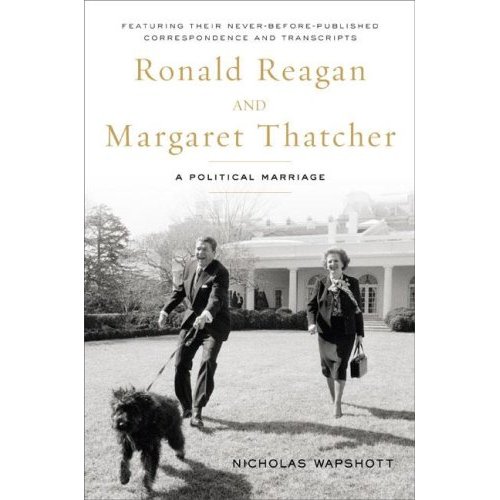|
|
|
In this book, New York Sun editor Nicholas Wapshott has achieved a dual biography of these two great leaders, as well as an interesting portrayal of their behind-the-scenes relationship as close allies and like minds. Margaret Thatcher acted throughout Ronald Reagan’s presidency as "an unofficial, unappointed, but wholly effective additional cabinet member," writes Wapshott. Thatcher, in turn, saw Reagan as not only an ally against Communism and a fellow economic conservative, but also "a good friend," and even an "example and an inspiration to us all," as she wrote upon Reagan’s leaving office. Wapshott allows Thatcher’s and Reagan’s own words to speak for themselves as much as possible throughout the book. Besides the challenges they shared abroad, Thatcher and Reagan faced a number of similar domestic policy challenges. Reagan called Thatcher’s task in implementing conservative policies in the U.K. even more "monumental" than his own: "England is about 15 years ahead of us in going down that road of intervention and outright nationalization of industries," he said in 1981. Wapshott extends his title’s marriage metaphor throughout the book, exploring how the two leaders dealt with occasional conflict and differing opinions, while never wavering in their essential shared agreement to conservative principles and worldwide freedom. Their moments of conflict prove especially revealing of their very different personalities and leadership styles, and make interesting reading for the curious. For example, Wapshott transcribes the greater part of their difficult conversation after Reagan took action in Grenada against Thatcher’s advice. After his 83rd birthday gala, which Thatcher attended, Reagan wrote to thank her for her presence and her lifelong friendship. "I feel that the Lord brought us together for a profound purpose," he wrote, "and that I have been richly blessed for having known you." As he wrote in an earlier letter, upon his leaving office, their partnership had "strengthened the ability and the resolve of the Western alliance to defend itself and the cause of freedom everywhere." Wapshott’s book offers fascinating new insights into that influential and successful partnership, which has left such a legacy worldwide. (Sentinel, 2008, 336 pps., $16.00) |
 He draws from both leaders’ collected papers, from their autobiographies and Reagan’s diaries, and from recently declassified private letters and telephone transcripts. The newly available papers offer especially fascinating glimpses into the relationship between the President and the Prime Minister.
He draws from both leaders’ collected papers, from their autobiographies and Reagan’s diaries, and from recently declassified private letters and telephone transcripts. The newly available papers offer especially fascinating glimpses into the relationship between the President and the Prime Minister.

